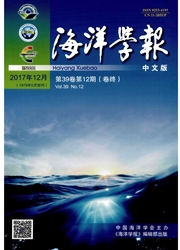

 中文摘要:
中文摘要:
In this paper, we emphasize the importance of accurate initial conditions in predicting high-impact ocean-atmospheric environmental events, such as El Nin?o-Southern Oscillation(ENSO), Indian Ocean Dipole(IOD), tropical cyclone(TC), and Kuroshio large meander(KLM), by reviewing recent progresses toward target observations for improving the initialization of these events forecasting. Since ield observations are costly and will never be dense enough to fully cover the vast space of these events, it is necessary to develop methodologies that guide the design of eicient and efective observation strategy. Of particular interest is a method called conditional non-linear optimal perturbation(CNOP), which has been shown to be very useful in determining the sensitive areas for target observations applicable to the predictions of ENSO, IOD, TC, and KLM. Further studies are needed to understand the predictability of these events under the inluence of climate change, and to explore the possibility of implementing ield programs of target observations. hese studies are challenging but are crucially important for improving our forecast skill of the high-impact ocean-atmospheric environmental events, and thus for disaster prevention,climate change mitigation, and sustainable socio-economic development.
 英文摘要:
英文摘要:
In this paper, we emphasize the importance of accurate initial conditions in predicting high-impact ocean-atmospheric environmental events, such as El Nino-Southern Oscillation (ENSO), Indian Ocean Dipole (IOD), tropical cyclone (TC), and Kuroshio large meander (KLM), by reviewing recent progresses toward target observations for improving the initialization of these events forecasting. Since field observations are costly and will never be dense enough to fully cover the vast space of these events, it is necessary to develop methodologies that guide the design of efficient and effective observation strategy. Of particular interest is a method called conditional non-linear optimal perturbation (CNOP), which has been shown to be very useful in determining the sensitive areas for target observations applicable to the predictions of ENSO, IOD, TC, and KLM. Further studies are needed to understand the predictability of these events under the influence of climate change, and to explore the possibility of implementing field programs of target observations. These studies are challenging but are crucially important for improving our forecast skill of the high-impact ocean-atmospheric environmental events, and thus for disaster prevention, climate change mitigation, and sustainable socio-economic development.
 同期刊论文项目
同期刊论文项目
 同项目期刊论文
同项目期刊论文
 Three-dimensional properties of mesoscale eddies in the South China Sea based on eddy-resolving mode
Three-dimensional properties of mesoscale eddies in the South China Sea based on eddy-resolving mode On the role ofwind and tide in generating variability of Pearl River plume during summer in a couple
On the role ofwind and tide in generating variability of Pearl River plume during summer in a couple Target observations for improving initializationof high-impact ocean-atmospheric environmentalevents
Target observations for improving initializationof high-impact ocean-atmospheric environmentalevents Validating satellite altimeter measurementsof internal tides with long-term TAO/TRITONbuoy observati
Validating satellite altimeter measurementsof internal tides with long-term TAO/TRITONbuoy observati On the role of wind andtide in generating variability of Pearl River plume during summer in a couple
On the role of wind andtide in generating variability of Pearl River plume during summer in a couple 期刊信息
期刊信息
